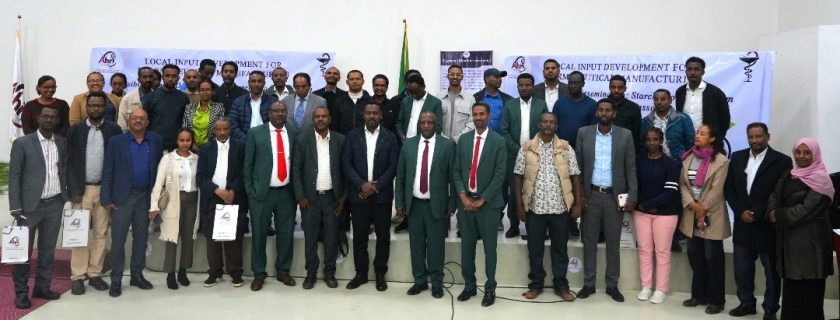AHRI, Addis Ababa, Ethiopia – July 17, 2025, In alignment with the global momentum surrounding cassava-highlighted during the recent World Cassava Day on June 28-the Armauer Hansen Research Institute (AHRI) organized a high-level dissemination workshop titled: “Local Input Development for Pharmaceutical Manufacturing: Feasibility Study on Starch Production from Cassava.”
The forum convened key stakeholders from across the private sector, academia, research institutions, financial organizations, development partners, government bodies, and the media. The central focus of the event was the presentation of a joint feasibility study by AHRI and the Industrial Projects Service (IPS) on the potential of cassava starch as a locally sourced input for Ethiopia’s pharmaceutical, food, and industrial sectors.

Delivering the keynote address, H.E. Frehiwot Abebe, State Minister of Health, emphasized the strategic importance of linking agriculture and industry through research: “Turning local plants such as cassava into viable pharmaceutical inputs through rigorous research and market integration is vital. With the government’s unwavering commitment to foster local pharmaceutical production, we’ve already witnessed significant progress—domestic public market share has grown from just 8% a few years ago to over 41% today. Initiatives like this are key to sustaining and accelerating that momentum.”

Prof. Afework Kassu, Director General of AHRI, also underscored the study’s alignment with national priorities: “This feasibility study represents a critical step in transforming scientific knowledge into scalable investment opportunities. It allows us to reduce reliance on imports, empower local industries, and support our national goals through evidence-based development.”
The feasibility study, presented by IPS, revealed compelling investment and socio-economic outcomes: Projected return on investment exceeds 50%, indicating strong profitability and low risk for potential investors; Production capacity of 14,611 tons annually, including native starch, pre-gelatinized starch, and dextrin; 117 new jobs to be created at full operation; Over 35,000 farmers engaged in cassava supply chains and ~90% import substitution potential with opportunities for regional export.

Additional presentations from Addis Ababa University and Wolaita Sodo University highlighted complementary research on cassava’s industrial applications and pharmaceutical value.

Asst. Professor Messay Wolde-Mariam, Deputy Director General for the Pharmaceutical Industry Development Sector at AHRI, closed the session with a strong call to action: “As part of AHRI’s core mandate to support local pharmaceutical manufacturing through research and innovation, this study marks a first milestone. Our next task is to translate these findings into action by working with government and private partners to mobilize investment and establish the plant—contributing to Ethiopia’s medium-term public development and industrialization agenda.”
The event concluded with a formal handover of the feasibility study report by AHRI, the Industrial Projects Service, and the Ministry of Health, symbolizing a shared commitment to advancing local input production and strengthening Ethiopia’s pharmaceutical industry.

